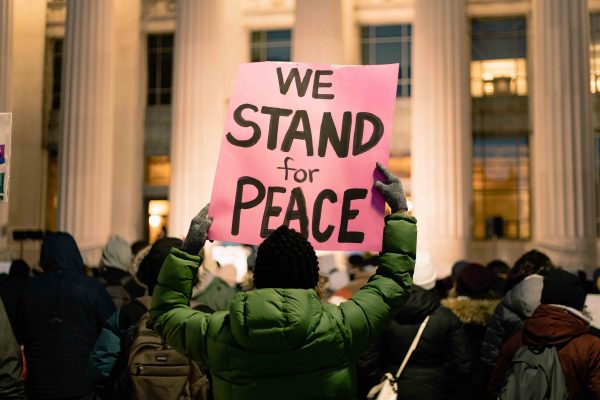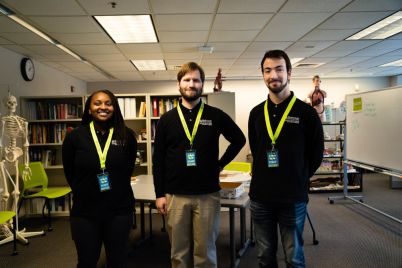
Community members gather in front of U-M’s Angell Hall on
Jan. 8 to protest U.S. involvement in the Middle East after the
recent U.S. drone strike on Iraq. Torrence Williams | Washtenaw Voice
By Lilly Kujawski
Editor
Last week, a couple hundred students and community members gathered in front of Angell Hall on the University of Michigan campus to protest United States military attacks on Iran and Iraq.
The protest follows the American drone strike in Iraq, authorized by President Donald Trump, that killed top Iranian military leader Qassim Suleimani on Jan. 3.
Speakers and protesters at the Jan. 8 demonstration expressed resistance against the current U.S. military presence in Iran and Iraq, as well as a greater push to end what they described as U.S. imperialism on a global scale.
“When I was six years old, I went to my first ever protest,” said Amytess Girgis, a University of Michigan student and the emcee for the protest. “There are photos of me, at age six—I’m 20 now—holding up a sign that says ‘no war on Iran’.”
Girgis’ identity as an Iranian-American has been “tumultuous” in the 14 years since that first protest in Washington, but challenging U.S. violence overseas remains as necessary as ever, she said.
“We are still here, standing, saying not only ‘no war on Iran,’ but we are telling the United States ‘stop militarization in the Middle East.’” Girgis said.
Other speakers at the protest posed concerns of the legitimacy of the recent U.S. attacks.
“We have to take a stand against an unjust war. The killing of general Suleimani was not the killing just of a bad guy, it was an assassination,” said Juan Cole, a history professor at U-M and a speaker at the event. “We have a rogue government. It’s a government we cannot trust with our security or our lives, and the way forward with Iran is the way of peace, not of war.”
“It is on American tradition to dissent when our government does something wrong,” Cole added.
Girgis said that despite Trump’s statements earlier that day that “The United States is ready to embrace peace with all who seek it,” the core mission of the movement remains the same.
“What we are here for is to end U.S. imperialism, it is to put an end to U.S. militarism both abroad and at home, and it is to build an anti-war movement in this country that is strong enough such that the United States cannot go around doing things like what it just did,” Girgis said.
Student veterans weigh in
The experience American civilians have during war and military strikes differs significantly from the experience of the civilians living in the countries where the action is happening, said Matthew Burtell, 23, a computer science major at WCC and student veteran who spent four years in the Navy and spent time stationed at a U.S. naval base in Japan.
“A lot of the aftermath is felt by the civilians of these different countries and it’s really for them who my heart goes out to,” Burtell said.
“If there is a serious conflict between America and Iran, it’s not going to be felt by American civilians, besides the people who are related to the American military personnel, and the American taxpayer,” Burtell said. “But it is going to be felt by children of Iranian parents, of people who are really seeing the destruction of their homes and mass displacement, as we saw in Iraq and as we saw in Afghanistan.”
“We know how this goes; it doesn’t turn out well for humanity,” Burtell said.
Many times when U.S. citizens speak out critically about their government, they’re considered “anti-American;” similarly, they may be seen as “anti-veteran” for speaking out against war or military action, but Burtell said the opposite is usually true.
“You’re pro the life and flourishing of our American military personnel if you’re against the Iraq war,” Burtell said.
Burtell said he doesn’t think the recent attack on Iraq reflects what the majority of the American people want.
“I think people are sick and tired of having the U.S. involved in conflicts that really, we have no business being a part of,” Burtell said. “We’re serving the interests of a few elites at our own expense and I think it would do well to vote them out of office, to make sure that these atrocities, like Iraq, like Afghanistan, never happen again, and god forbid, Iran happen at all.”
Burtell said some people might think that veterans tend to have very similar viewpoints, but in fact they can differ vastly.
Anthony Colton, 27, an engineering science major and fellow student veteran, shared a different perspective on the Iran-Iraq situation.
To Colton, tensions have been rising over many years to get to this point. Iran has been “poking the bear,” he said.
“With the acts of aggression from Iran over the past couple of years, America needed to re-establish a deterrence that, if you mess with America more and more, you’re going to get equal, if not worse, retaliation,” Colton said. Colton served in the Army for six years as an explosive ordnance disposal technician stationed in North Carolina.
“America doesn’t want to get into conflict just as much as Iran doesn’t want to get into conflict,” Colton said. “Nobody wants to go to war, nobody desires war, but America will be defended until the end.”
What about the draft?
Some young men may have been concerned recently when filling out the Free Application for Federal Student Aid. American men between 18 and 26 are legally obligated to register for the Selective Service, even though there isn’t an active draft
Registering for the Selective Service is also required by the U.S. Department of Education in order for students to get federal financial aid for college, said Kristen Hooper, WCC’s financial aid coordinator.
The last time the U.S. had an active draft was in 1972 during the Vietnam War.
Colton added that he doesn’t see the draft being a cause for concern any time soon.
“For the draft to occur there would have to be extreme casualties, not only on our side but on the enemy side to initiate a draft,” Colton said. “The draft is so far out of reach it would have to take, potentially, nuclear war to constitute initiating a draft.”


